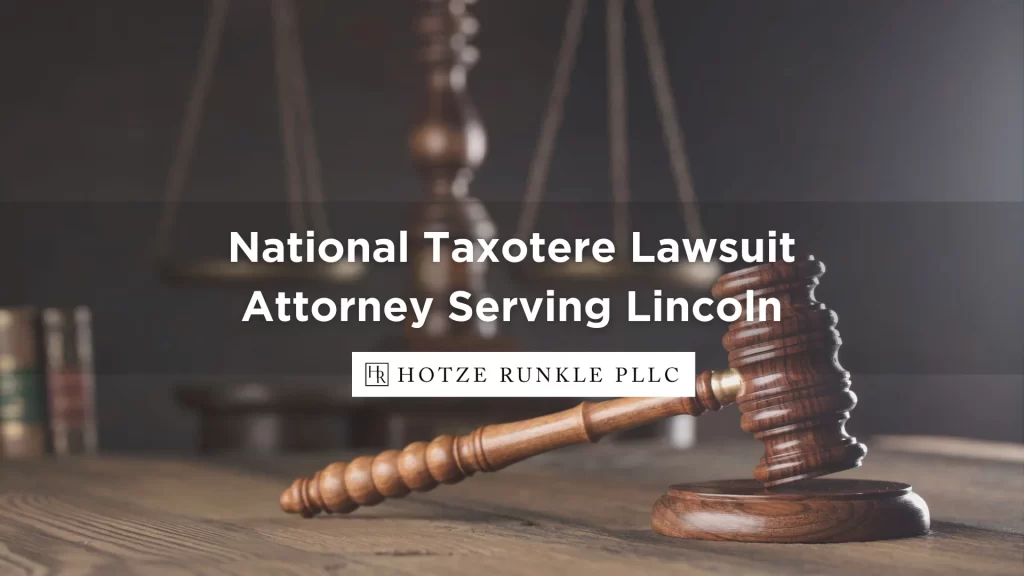
If you developed uncontrollable and excessive watery eyes during or after completing chemo with Taxotere, you could be owed significant compensation. The Taxotere attorneys of Hotze Runkle PLLC have extensive experience helping people like you in Lincoln and across the state of Nebraska get justice when a drug causes them harm. We’ll be ready to put our skills and resources to work for you.
Sanofi-Aventis is a large drug manufacturer that created Taxotere to treat a range of different cancers. It shrinks cancer cells, preventing them from spreading to the lymph nodes, organs, and other parts of the body. However, it can cause adverse reactions that lead to unusual side effects that Sanofi never warned doctors or patients about.
Studies performed by multiple researchers found a link between Taxotere and a person’s tears. As the chemo medication travels through someone’s body, it interacts with bodily fluids, including tears. That causes inflammation and excessive eye-watering. If you have these symptoms and have taken Taxotere, you have a right to hold Sanofi liable for failing to market their drug properly and withholding information about the possible symptoms it causes.
Common Symptoms Associated with Taxotere
Whether you’re a current or former cancer patient taking Taxotere during chemotherapy, you might have noticed some side effects that you didn’t expect. Many people ignore watery eyes, thinking this is a typical chemo symptom that will pass over time. However, it doesn’t go away without medical treatment. Epiphora, excessive eye-watering, occurs when the canaliculus, a vital structure that facilitates the flow of tears, becomes inflamed.
Epiphora can resolve on its own when the inflammation is the result of allergies or a cold, but when it’s due to Taxotere, it can progress. If you don’t see a doctor immediately, the symptom can worsen, leading to Canalicular Stenosis. This is an irreversible condition that damages the canaliculus in one or both eyes, preventing tears from draining into the nasal cavity. Whether partial or complete closure occurs, a doctor can’t reverse the effects.
Symptoms commonly associated with Canalicular Stenosis are:
- Dry eyes
- Swollen eyelids
- Headaches
- Eye infections
- Blurry vision
- Central vision loss
- Excessive watery eyes
- Light sensitivity
- Clouded vision
You should notify your oncologist and make an appointment with an ophthalmologist if you’re on a Taxotere regimen and notice signs of epiphora or Canalicular Stenosis symptoms. Your doctors can evaluate your condition and determine the best options for treating your symptoms so they don’t become a bigger issue.
How Does Taxotere Cause Canalicular Stenosis?
Your doctor will administer Taxotere chemotherapy on a specific regimen depending on the type and stage of cancer. You could receive this treatment once a week, every other week, or once every three weeks. It’s given either orally or intravenously. The drug can cause various symptoms no matter how often you’re undergoing treatment.
While medical researchers were studying the effects of Taxotere on a group of patients, they looked for why these symptoms developed. They discovered that when the drug comes into direct contact with the patient’s tears, inflammation results when the mixture travels through the canaliculus. Inflammation can lead to chronic eye infections that create blockages, so tears cannot pass through anymore.
It’s been over 20 years since studies confirmed the link between Taxotere and the development of Canalicular Stenosis. However, Sanofi did nothing to warn patients of the risk during this type of chemo treatment. It wasn’t until years later that they finally notified the U.S. Food and Drug Administration of the problem and put warning labels on their drug.
Surgical Procedures That Could Alleviate Canalicular Stenosis Symptoms
When the canaliculi begin to close, there’s nothing you can do to open them. You might be able to manage the symptoms you’ve been experiencing with dacryocystorhinostomy (DCR). During this surgery, the surgeon will make an incision between your eye and nose to create a new passageway with adjacent eye structures underneath. If successful, the tears would bypass the damaged canaliculus and travel through this new passageway.
In extreme Canalicular Stenosis cases, the canaliculus has become so severely damaged that the surgeon can’t use any structures to create a passageway. Another available option is conjunctivodacryocystorhinostomy (CDCR). During this procedure, the doctor takes a Jones tube, a small glass tube, and inserts it over the closed canaliculus. This tube works as a funnel to bring the tears from the tear duct to the nasal cavity.
Both surgical options are invasive and expensive. You face risks, no matter which surgery you choose. They can cause varying symptoms ranging from minor to severe, such as:
- Blindness
- Tissue damage
- Facial scars
- Chronic eye infections
- Uncontrollable bleeding at the incision site
- Migrating Jones tube
- Sinusitis
The best decision you can make would be to notify your oncologist and ophthalmologist of any unusual symptoms that start and discuss your medical options. They could evaluate your overall health and determine if you qualify for one of these surgeries. It could be successful in alleviating your symptoms and stopping the progression of this serious medical condition.
Compensation Available In A Lawsuit Against Sanofi
 Sanofi-Aventis failed to warn doctors and patients about the side effects Taxotere can cause. As a result, you suffered multiple losses that required medical treatment. Medical bills and associated costs are expensive and something you should have never faced in the first place. When you file a lawsuit, you could seek compensation for the following losses:
Sanofi-Aventis failed to warn doctors and patients about the side effects Taxotere can cause. As a result, you suffered multiple losses that required medical treatment. Medical bills and associated costs are expensive and something you should have never faced in the first place. When you file a lawsuit, you could seek compensation for the following losses:
- Medical bills
- Lost wages and earning capacity
- Loss of consortium, society, and companionship
- Pain and suffering
- Out of pocket expenses
- Emotional distress
State law requires complying with a deadline known as a statute of limitations if you want to sue Sanofi-Aventis for compensation. The statute of limitations in Nebraska is four years. That means you must file suit within four years of the date you sustained injuries from Taxotere. After this deadline passes, you won’t have the opportunity to hold the drug company liable for their actions.
Take Our Taxotere Quiz Today
Find out if you are entitled to financial compensation from a lawsuit against Sanofi-Aventis. All you have to do is complete our short Taxotere Case Evaluation form and we’ll let you know if we can represent you in your case.